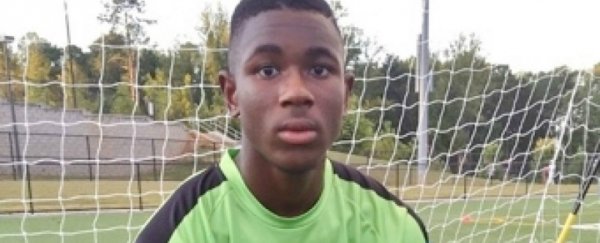A 16-year-old in Atlanta has made headlines this week after waking up from a coma speaking fluent Spanish.
Rueben Nsemoh is a native English speaker who knew some basic Spanish before he suffered a concussion during a soccer game, but when he woke up from the injury, he was able to speak Spanish "like a native", and struggled with English.
"It started flowing out," Rueben told Melissa Chan over at TIME. "I felt like it was like second nature for me. I wasn't speaking my English right, and every time I tried to speak it I would have a seizure."
"It was weird," he added. "It was not scary at all. I actually liked it a lot. It was really unique to me."
In the weeks since, he's slowly been regaining his ability to speak English, and his Spanish skills are fading, but doctors are struggling to explain exactly what happened.
The case almost sounds too bizarre to be true, but Rueben is not the only one who's had this experience. The news is full of stories of people surviving head injuries only to start speaking in another language, like this Englishman who began speaking Welsh following a stroke, even though he'd never formally learnt the language.
Or this Croatian teenager, who woke up from her coma able to speak fluent German, even though she'd only just begun studying it.
And, back in 2013, an Australian man woke up from a car crash speaking only Mandarin, a language he'd studied at school but wasn't previously fluent in.
What all of these cases have in common is that the patients all knew the language they went on to speak to some extent, although not fluently. They all suffered a severe head injury, and all struggled to speak their native language when they first woke up. Over time, that ability returned to them.
But from a scientific point of view, how is this possible?
The reality is, researchers still aren't entirely sure, but the new-found language abilities seem to be caused by the brain rewiring itself following traumatic injury, and are most likely an offshoot of the well-documented but rare condition called Foreign Accent Syndrome.
There have been at least 200 cases of Foreign Accent Syndrome documented, which occurs when someone recovers from a brain injury only to find themselves speaking in a foreign accent.
In one of the first documented cases, a Norwegian woman was hit by bomb shrapnel during a WWII air raid, and woke up with a German accent - her friends and neighbours subsequently shunned her because they thought she was a spy.
The syndrome is caused by damage to the part of the brain that controls the muscles used to produce speech.
"Speaking requires very precise control of the muscles of lips, tongue, and jaw (the speech articulators) and the larynx (voicebox)," wrote Lyndsey Nickels from Macquarie University for the Conversation back in 2013.
"If the placement of the articulators, speed or coordination of movements are slightly out of sync, then speech sounds will be altered."
So people aren't truly speaking in a new accent, they're just losing control over the way they'd usually pronounce vowels and consonants, and this can make them sound like they're speaking with a certain accent.
This can also lead to people sounding like they're fluent when they speak another language, even if they're making lots of mistakes.
And this might be part of what's going on when people wake up from a head injury being 'fluent' in another language, as in the case of Rueben Nsemoh. In reality, these patients might not actually be that skilled at the new language as they sound, but their new accent might make them sound that way.
There's also the possibility that the ability to suddenly speak a little-known language fluently could be more to do with the fact that the patients all seem to lose their native language immediately after the injury.
This could be a result of something known as aphasia - a common impairment of language that's often caused by strokes. It's been described as feeling like words are on the tip of your tongue all the time, but you can't access them.
Usually aphasia would affect all languages a person knows, but it's possible in these cases that it's only affecting the patients' native language - which is allowing them to access parts in a secondary language they didn't even know they knew.
With regards to the Croatian teenager who woke up only being able to speak German, Steven Novella, a neuroscientist from Yale University, wrote over on the neuroscience Neurologica Blog:
"The question is - could she have an unusual form of aphasia that is impairing her ability to disinhibit her Croatian language, leaving her only able to speak German? This could theoretically have the effect of making her German seem more fluent, because she does not have to expend mental energy inhibiting her Croatian - that has become automatic."
For now, these are just hypotheses, and there have still been no peer-reviewed case studies of people waking up from a head injury speaking a second language.
But hopefully with more research we might finally begin to understand how our brains rewire themselves following injury, sometimes to give us remarkable new abilities.
